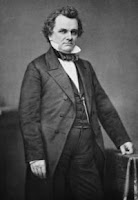And what if McClellan had won the presidency in 1864? It's well known that in the summer of 1864, Lincoln doubted his chances for re-election, though perhaps even he was being too gloomy about his prospects. In any case, with the fall of Atlanta at almost the same time as McClellan's nomination, things were looking up for Lincoln. Besides, McClellan's candidacy had something of a ball-and-chain in the form of the party's copperhead platform, which he took great pains to distance himself from. It didn't do him any good -- he lost to Lincoln by a fair margin. Father Abraham outpolled Little Mac even among the Army of the Potomac voters, it seems.
The September 17, 1864, issue of Harper's Weekly had this to say: "General McCLELLAN'S next appearance is as the candidate of the Democratic party for the Presidency. The platform of the party which nominated him is only too evidently a peace-on-any-condition platform. It declares explicitly in favor of an immediate armistice, which will restore to the rebels all which they have lost, and whether the Convention of States which it advocates results in Union or not it still declares for peace. It says distinctly : " The experiment of restoring the Union by war has proved a failure." McCLELLAN'S exposition of his own views in his West Point speech is just as explicit in the opposite direction. He says:
" 'To efface the insult offered to our flag, to secure ourselves from the fate of the divided Republics of Italy and South America, to preserve our Government from destruction, to enforce its just power and laws, to maintain our very existence as a nation, these were the causes which impelled us to draw the sword. Rebellion against a Government like ours, which contains the means of self-adjustment and a pacific remedy for evils, should never be confounded with a revolution against despotic power which refuses redress of wrongs. Such a rebellion can not be justified upon ethical grounds, and the only alternatives for our choice are its suppression or the destruction of our nationality. At such a time as this, and in such a struggle, political partisanship should be merged in a true and brave patriotism, which thinks only of the good of the whole country. It was in this cause and with these motives that so many of our comrades have given their lives, and to this we are all personally pledged in all honor and fidelity. Shall such devotion as that of our dead comrades be of no avail? Shall it be said in after ages that we lacked the vigor to complete the work thus begun? That after all these noble lives freely given we hesitated and failed to keep straight on until our land was saved? Forbid it, Heaven, and give us firmer, true hearts than
that!' "






















